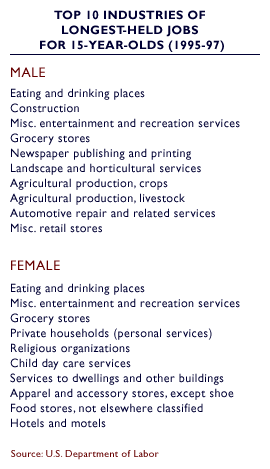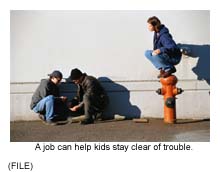|
Youth in action
|
 |
September 4, 2000: 7:23 a.m. ET
The next generation of employees often needs help in developing job skills
By Staff Writer Rob Lenihan
|
NEW YORK (CNNfn) - With all the barbecues going on, the last thing most adults want to think about on Labor Day is work.
But adults aren't the only ones working. Young people, who will soon be heading back to school, are also an important part of the employment picture, and they will be joining the adult work force a lot sooner than you think.  The issue is whether or not they will have the skills they need when they become adults. The issue is whether or not they will have the skills they need when they become adults.
In the preface to the Report on the Youth Labor Force, Alexis M. Herman, secretary of the U.S. Department of Labor, focuses on the importance of early work experience, saying, "Teenagers who deliver newspapers, bag groceries, or serve hamburgers in their after-school jobs are often more likely to go to college and have better lifelong careers. And make more money, too."
Learning experience
Herman and others stress the positive effects of work for young people, as long as the job sites are safe and the job does not interfere with school.
William Rodgers, the Labor Department's chief economist, said work experience can teach young people such concepts as punctuality, communication and working with others.
"Getting a foot in the labor force in a structured and safe environment is very important," he said.
The Youth Opportunity Movement, a Labor Department initiative, is designed to help young people, particularly those in need, obtain the skills and work experience that will prepare them for later life. The program's founders include corporations, foundations and entertainers and athletes.
Naturally, any discussion of a successful career must look at education. Richard J. Murnane, an economist at Harvard's Graduate School of Education, said the impact of education—or the lack of it--shows up quite clearly in salary figures.
"It is striking how very hard it is to earn a decent living without some post-secondary education," said Murnane, co-author of the book "Teaching the New Basic Skills: Principles for Educating Children in a Changing Economy."
It is can be difficult, however, to impress upon a teen-ager the need for studying algebra now because of the effects it will have later on in both academic and professional arenas.
The trouble is compounded because many teen-agers come to college without the basic reading and math skills they should have learned in grammar and high school.
"The initial challenge," Murnane said, "is to improve our K-12 education system. It is not a national endeavor ... but a number of states are making progress."
What's out there?
From 1996-98, 2.9 million young people aged 15 to 17 worked during the school months and 4 million worked during the summer, according to the Labor Department. 
While many people may think young people work more now than they did in the past, the youth population and the proportion that is working has declined. The 2.9 million employed youths in the school months of 1996-98 represented a 28-percent decline from 1977-79.
Rodgers said the types of jobs open to young people have not changed drastically over the years. Most of the 14- and 15-year-olds who worked were employed in either the retail or services industries. This was followed by entertainment and recreation industries and construction.
Among youths who held freelance jobs, babysitting and yard work were the most popular. The difference between the genders was dramatic, the report said, with more than 90 percent of females at ages 14 and 15 having done some babysitting.
Only 20-to-25 percent of males in this age group had done this kind of work, while nearly three-quarters of working male youths reported doing yard work. This compares to only one in 10 females.
Start 'em young
Eva Marques has an eye for helping young people find work. The author of "100 Jobs for Kids & Young Adults-A Self-Empowerment Tool," she sees computers at the biggest source of job opportunities for young people today.
Whether as tutors, Web designers or video game creators, Marques said young people can find a lot more to do with a computer then bouncing around a chat room. 
"I know several students who created their own business at age 12 or 13," she said. "One kid was building computers at eight years old."
Labor Department officials said computer-related jobs have only shown a slight increase for 16-to-19 year-olds between 1989 and 1999. They said they expect these numbers to grow in the coming years.
In her book, published by WiseChild Press, Marques provides exercises to help teens identify their inherent life skills.
Areas of interest are broken down in categories from "Things I like to do and do really well," to "Things I don't like to do and don't do very well," so young people will be able to get a clear view of their own abilities.
Know a kid who is into graffiti? Then, Marques said, you know a potential logo designer. Maybe there's a restaurant or club in your neighborhood that's in dire need of some funky new signage. Bring the kid and the business together and you might be setting a young person on to a career path.
"Children with multi-language skills can be tutors," Marques said. "If they can translate for family members, they can also do that for neighbors. Or they can translate menus for restaurants. I've been in many restaurants where (the menu) can be just plain silly."
No vacuum
Marques also includes in the book's appendix advice on how to compute hourly rates and profits, determine costs and keep records. The book also contains a guide on work conduct and dress.
Naturally, she said, young people are going to need help finding their direction in life from a parent, a teacher, a club leader, or some other adult leader.
"It depends upon the enthusiasm given to them from above," she said. "They really need coaching. It's not the kind of thing you can do in a vacuum." 
|
|
|
|
|
 |

|

